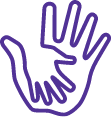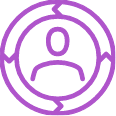Health & Wellness
Crisis Support
How Do You Know You’re In Crisis?
A crisis can happen in a moment or develop over time. For example, if your apartment caught fire and you lost everything; that’s a crisis happing in the moment. On the other hand, you might be doing poorly in school, and you are advised to drop a course. You didn’t realize that you would lose your tuition waiver, which was your living support money from the government. Now you are not sure how you will pay rent. In this example, one action set off a chain of events that led to a crisis.
All crises is valid, and so are your emotions.
How do I know if I am in crisis?
When you’re in crisis, you might experience overwhelming emotions that have a negative impact on your behaviour. For example, some people have a hard time sleeping when they are in crisis, and that might lead to worse performance at work or school.
Feelings Associated with Crisis
- Feeling sad or depressed most of the time
- Clinical depression: deep sadness, loss of interest, trouble sleeping and eating which doesn’t go away or continues to get worse
- Feeling anxious, agitated, or unable to sleep
- Frequent and dramatic mood changes
- Expressing feelings of excessive guilt or shame
- Feelings of failure or decreased performance
- Feeling that life is not worth living, having no sense of purpose in life
- Feeling trapped, like there is no way out of a situation
- Feeling of desperate, that there’s no solution to their problems
Behaviour Associated with Crisis
- Neglecting personal hygiene, deteriorating physical appearance
- Withdrawing from friends, family, and society
- Sleeping a lot more than usual
- Losing interest in hobbies, work, school, or other activities
- Performing poorly at work or school
- Acting recklessly or engaging in risky activities, including taking risks that could lead to death, such as driving fast or running red lights
- Violent behaviour such as punching holes in walls, getting into fights or self-destructive violence; feeling rage or seeking revenge
- Giving away prized possessions
- Putting affairs in order, tying up loose ends, or making out a will
- Seeking access to things that could be used to hurt yourself or others
I’m in Crisis Now
If you are in crisis, or think you might be, there are resources available to you by phone, in person or virtually.
Some people experience high anxiety while in crisis, which can make it scary to contact someone for help. If this is a barrier for you, try asking a friend or a supportive adult to sit with you while connecting with crisis support. This could mean going to the crisis centre with you, or being by your side when you call.
Check free services available 24 hours a day/ 7 days a week
Klinic Crisis Line
The Klinic Crisis Line provides free and confidential counselling, support and referrals for people who are suicidal, in crisis or struggling to cope.
204-786-8686 or 1-888-322-3019
TTY 204-784-4097
All ages welcome
Manitoba Suicide Prevention & Support Line
The Manitoba Suicide Prevention & Support Line is for people who are struggling with suicidal thoughts or feelings; concerned about a friend, family or co-worker; or impacted by a suicide loss or suicide attempt.
1-877-435-7170 (1-877-HELP170)
All ages welcome
Kids Help Phone (national line available to Manitoba Youth)
Kids Help Phone provides virtual and telephone counselling and volunteer-led, text-based support in English and French to youth across Canada. Kids Help Phone also provides information on how to access community support services for youth.
1-800-668-6868
Ages 5-25 years old
Klinic Sexual Assault Crisis Line
The Klinic Sexual Assault Crisis Line provides support to anyone 12 and up who has experienced sexual assault.
204-786-8631 or 1-888-292-7565
TTY 204-784-4097
All ages welcome
Manitoba Farm, Rural & Northern Support Services
Manitoba Farm, Rural & Northern Support Services provides telephone and online counselling to farmers, rural and northern Manitobans.
supportline.ca – online counselling
1-866-367-3276 (hours Mon-Fri 10 am to 9 pm)
All ages welcome
First Nations and Inuit Hope for Wellness Help Line
The Hope for Wellness Help Line offers immediate help to all Indigenous peoples across Canada. It is available 24 hours a day, seven days a week to offer counselling and crisis intervention available in English, French, Cree, Ojibway, and Inuktut.
1‑855‑242-3310
All ages welcome
Shared Health Mental Health & Wellness Resource Finder
The Mental Health and Wellness Resource Finder provides a number of mental health, wellness and addictions supports and resources for you and those you care about.










